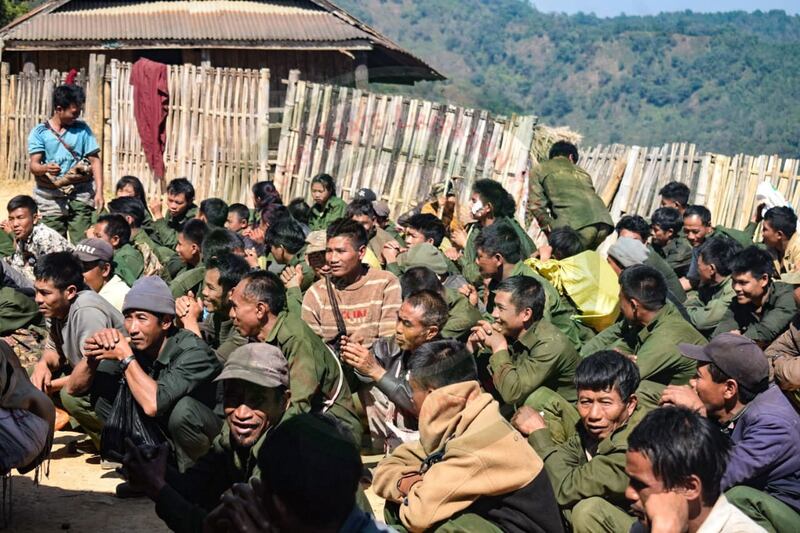Quietly slipping into a pro-junta militia camp, rebel soldiers of the ethnic Ta’ang minority began freeing more than 120 of their people who had been forcibly detained, including more than two dozen women and children.
When the pro-junta fighters realized what was happening, a firefight erupted as the people fled, residents told Radio Free Asia in describing Saturday’s raid.
Suddenly, a military helicopter arrived over the camp on the outskirts of Ja Yang village in Lashio township, in Myanmar’s northeastern Shan state. It fired a hail of bullets and dropped bombs to try to repel the Ta’ang National Liberation Army soldiers before flying off.
By the time the dust settled, the ethnic fighters had freed 127 members of the Ta’ang Palaung community, including 15 women and 20 children between the ages of 8 and 17, who had been forced to fight for the pro-junta forces at the behest of the military, said TNLA spokesman Lt. Col. Ta Pan La.
“Our misery is all due to the militia – they have been recruiting people by force, including schoolchildren,” said one resident of Lashio, who like others that spoke to RFA asked to remain unidentified, citing fear of reprisal. “That’s why the TNLA raided their militia camp.”
“The clash started then. I don’t know when military troops arrived, but they were there. At around 8:30 a.m., an aircraft hovered while firing, dropped two bombs and flew away.”
Conscripts
In early 2023, the junta started reinforcing its allied militia forces by conscripting area residents, including children, Ta Pan La said.
“Some of the children have been held at their training camp against their will for three or four months,” he said. “Their parents came to [us] and complained, so we were obligated to help them.”
While there is no compulsory military service in the country, legislation requires each district to meet recruitment quotas. Under threat of being fined for failing to meet quotas, district authorities often coax children into joining the army through financial rewards or prestige. Other times, the military abducts children from public areas and forces them to become soldiers.
According to the United Nations Office for the Coordination of Humanitarian Affairs, the highest number of recruited child soldiers in Myanmar occurred during the rule of the country’s previous junta, between 1990 and 2005. In 2001, Human Rights Watch found that Myanmar had approximately 70,000 child soldiers.

Ta Pan La said that his group had arranged for the younger children rescued in the raid to return to school and for others to go into hiding to avoid being forcibly recruited again.
The spokesman told RFA that members of the Ta’ang ethnic community in Lashio township have been subjected to forced recruiting by various armed groups “for ages,” and saidT the TNLA regularly warns militias in the region to end the practice.
Despite Myanmar’s recent efforts to decrease the number of child soldiers, recruitment continues today. In 2021, the United Nations verified the recruitment and use of 790 children the previous year.
Differing accounts
A pro-junta militia officer gave a very different account, saying the TNLA was guilty of recruiting child soldiers.
Speaking to RFA on Tuesday, a militia officer in the region who has ties to the Ja Yang militia claimed that the 20 children freed from the camp had been “sent to them because [villagers] were afraid they would be recruited by the TNLA.”
The rest of the people evacuated in the raid “were [the militia’s] former soldiers and family members,” he added, speaking on condition of anonymity.
The militia officer said that when the Ta’ang soldiers entered the camp, “they used nearly 50 villagers, including children and pregnant women from the Ja Yang militia's families, as human shields,” so the militia fighters were reluctant to return fire.
His claims could not be independently verified by RFA.
A woman from Lashio township disputed the militia officer’s account, insisting that the Ta’ang detainees had been recruited by force over the past two months.
“They gave us a list of the names of people who they had chosen to recruit and later came to collect them,” she said. “They were training them when [the raid] happened two days later, which is why they were among those freed.”
The military has yet to issue a statement about the weekend raid and attempts by RFA to contact the junta spokesperson for Shan state were unsuccessful due to telecommunications disruptions.
Translated by Myo Min Aung. Edited by Joshua Lipes and Malcolm Foster.
